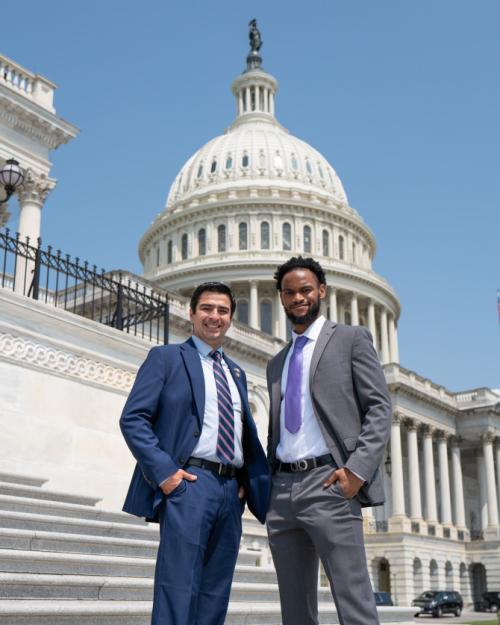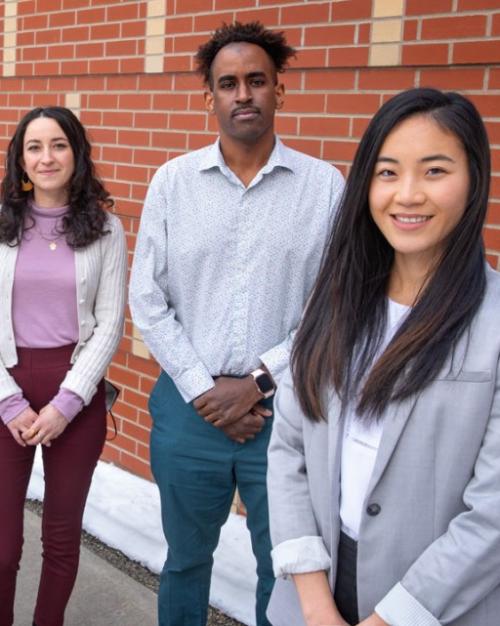Cornell and community members now have a new resource to understand and help break down barriers between people and facilitate partnerships to advance equity.
The Cornell Center for Cultural Humility facilitates culturally responsive research, practice and policy that is inclusive across race, ethnicity, class, sexual orientation, gender, religion and other markers of identity. The center’s trainings and programming are open to Cornell community members, external academics, nonprofits, businesses and the general public.
“We’re training people all over on how to better engage with people who are different from them. And we’re trying to do that in a way that feels purposeful and nonjudgmental,” said Jerel Ezell, the center’s director and assistant professor of Africana studies in the College of Arts and Sciences. “This is an evidence-based, engaging step that you can take if you want better research and engagement with cultural minorities in particular.”
The impetus for creating the center stemmed from “a recognition that a lot of people, particularly from underserved populations, often don’t want to participate in research or don’t participate fully, or they don’t want to engage with clinicians or get checkups or whatever the case may be,” Ezell said.
Cultural humility emphasizes the impossibility of knowing everything about a culture, said Ru Liu, one of the center’s trainers and a doctoral student in nutrition. “Cultural humility focuses on essentially being a lifetime learner.”
Being culturally humble goes beyond creating a dialogue between two different people, as traditional diversity, equity and inclusion dialogues tend to do, said Sanvi Bhardwaj ’24, the center’s event coordinator and a health care policy major.
“Instead, it’s understanding that even though our cultures and backgrounds are different, they are fundamental in shaping how we look at the world,” she said, “and by putting this at the forefront, you can have more engaged conversations, which are more thoughtful and more purposeful, and actually work to build a relationship as opposed to a one-sided conversation between two different people.”
Cultural humility consists of three components, Liu said: having self-awareness, the capacity to reflect on your identities, how others perceive you and how you perceive yourself; being trauma-informed, affirming the trauma that individuals and communities have experienced; and being strengths-based, acknowledging the strengths of individuals and communities.
“In research, we see a lot of programs that are more deficit-focused, meaning that we’re looking at a community and we’re seeing what they lack,” she said. “But the strengths-based approach leverages the resources and strengths that individuals and communities already have.”
Ezell has done these types of trainings for a decade. From 2013 to 2017, he facilitated trainings and did research with social workers and child protective services staff who worked with children and families in the foster care and child welfare system who had experienced traumas related to abuse and neglect.
The center’s trainings will be co-facilitated by community members and Ezell, Liu, and Iman Alsmadi, one of the center’s cultural humility trainers and a doctoral student in sociology; Natalie Gosnell ’24 is the center’s community outreach coordinator.
“It’s not just going to be us coming in and saying, ‘This is how we think you should do this.’ It’s going to be these communities saying, ‘This is what we’re about, this is what we expect, and these are our strengths,’” Ezell said.
The center’s Cultural Humility Training, a four-hour program spread over two days, offers a look at the foundations and modern applications of cultural humility and its offshoots, cultural competence and cultural sensitivity. Participants also explore their identities and beliefs through interactive activities; in simulation activities, participants come up with potential solutions for and interpretations of real-life situations, Liu said.
“Through the exercises, the goal is to understand yourself better and maybe realize the assumptions that you tend to make about specific groups of people,” Liu said. “You’re trying to not assume you know it all, based on, for example, the things you’ve read.”
Other programming includes Equitable Research Design Training, which teaches participants the fundamentals of collaborative research with historically marginalized and hidden populations; Citizen Science Training, which empowers and equips community members with the scientific acumen and public advocacy tools needed to build and sustain wellness and stability in their neighborhoods; and Community Partner Matching, which connects academics and organizations with communities to advance projects focused on social, environmental and health justice and equity. The center will also host public speakers who will talk about best practices in cultural humility.
Administratively, the center is part of the Office of the Vice President for Research and Innovation. “OVPRI is supporting this center because we understand that well-designed, well-built research partnerships are the bedrock of research,” said Maria Fitzpatrick, associate vice provost for social sciences and professor of economics and public policy in the Cornell Jeb E. Brooks School of Public Policy. “Often, our research could benefit from a better understanding of how to connect and communicate with our community partners. The Center for Cultural Humility will provide researchers with tools and trainings about how to engage with members of the community in more impactful ways.”
Researchers will find a cultural humility approach produces better, more robust research, because members of these communities will be more willing to participate in their studies and offer their truths, Ezell said. “We’re not saying just because you do four hours of training, you’re going to learn how to be culturally humble,” he said. “But we are saying this is an important step to take if you want to do better research with humans and have more nuanced and meaningful interactions with cultural minorities.”
The trainings are also for people and organizations working in clinical, institutional and business arenas; limited cultural humility is universal, not specific to Cornell, Ezell said. “We want to have a good model that makes participants feel comfortable coming in and saying, ‘I don’t understand or relate to this particular cultural dynamic, but I see, or want to see, the value in trying to understand and relate to it.’”




